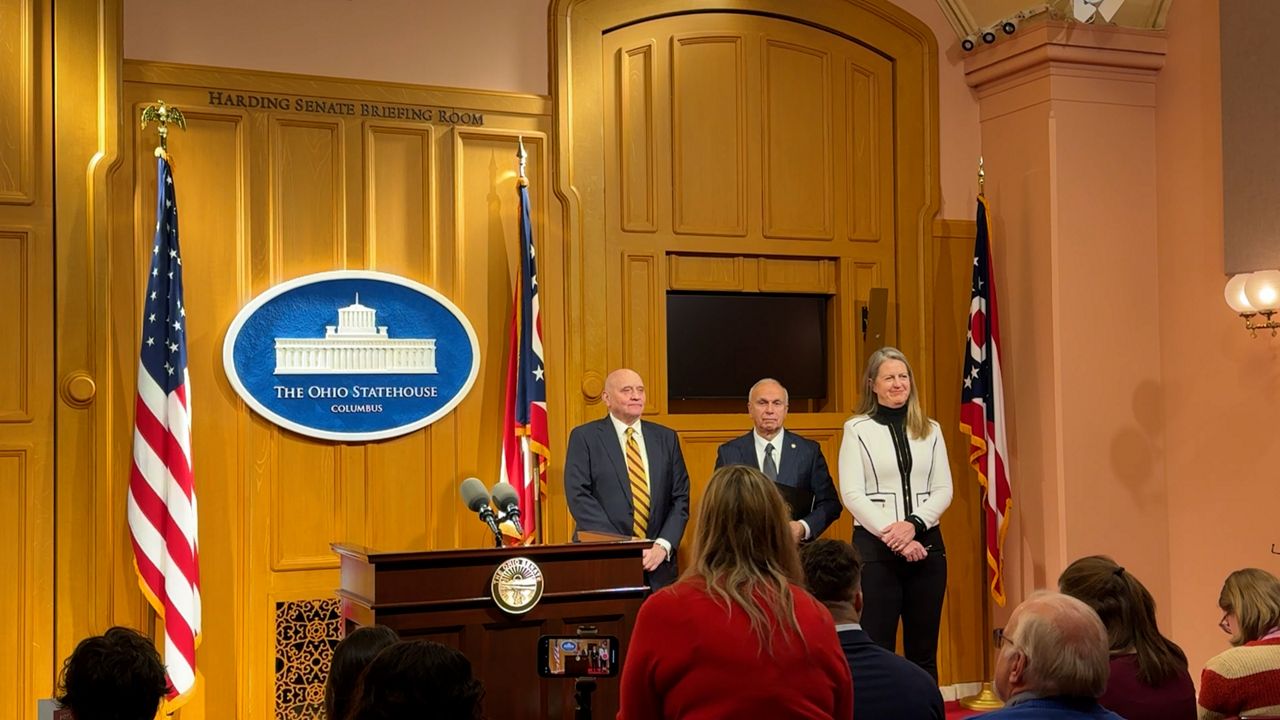COLUMBUS, Ohio — This is the second time in two years, a higher education bill has passed the Senate.
Senators approved Senate Bill 1 Wednesday afternoon, which moved it one step closer to Gov. Mike DeWine’s desk.
State Sen. Jerry Cirino, R-Kirtland, said the bill aims to reform higher education and end campus cancel culture. But opponents said it’s the death of higher education, it’s anti free speech and anti-union.
“With 21 yeas and 11 nays, the bill is passed and entitled,” said State Sen. Rob McColley, speaker of the Senate, after almost three hours of debate.
But it’s passing the Senate with the same pushback it had when it was first introduced and it comes one day after hundreds of opponents spoke up against the bill in committee.
The bill would make schools promise not to influence student views on “controversial” topics, eliminate the voting rights of student trustees at Ohio State University, require every Ohio college student to take a three-hour civics education course, and impose dozens of other programmatic and administrative changes. Schools that violate the measure — should it become law — would risk losing their state funding.
Cirino’s focus is for every child in Ohio to be able to pursue the education they want, he said.
“We had a marathon hearing of mostly opponents, and we gave everybody the opportunity to speak. Tell us about the bill. There were a lot of inaccurate and uninformed, you know, opinions,” Cirino said. “I want them all to have an equal opportunity to participate. We just have to do it based on merit and not discriminate against some parties, because other parties get a preference.”
But Nica Delgado, digital organizer from the Ohio student association, said this bill does the opposite from welcoming all children.
Delgado said it would kill higher education in the state if it became law.
According to the bill, no higher education institution shall provide or require training for concepts such as one race or sex is inherently superior to another.
“I won’t be able to learn properly about racism, slavery, eugenics, phrenology, possibly evolution,” Delgado said. “Which is incredibly important for an anthropology student.”
Democratic senators vehemently pushed back against Republicans' arguments in favor of the bill, with several Black senators delivering particularly fiery rebuttals.
State Sen. Hearcel Craig, a Columbus Democrat who is Black, noted that white supremacist groups have marched in Columbus and Cincinnati in recent weeks. He said it is important at this historical moment that colleges and universities have the opportunity to tell “the truth, the whole truth and nothing but the truth” about Black history in this country.
He added that DEI programs benefit not only Black students, but veterans, women, those with disabilities and others.
“Every student who has benefited from DEI programs proved themselves to be more than capable and deserving of opportunities to attend universities," he said. “They weren't just handed an education; they worked for it.”
According to the bill, a state institution shall, to the extent possible, eliminate diversity, equity and inclusion requirements.
This would mean that funding for people who could get scholarships from these programs wouldn’t occur, Delgado said.
“Personally, I’m liable to lose my funding for the graduate program that I want to go into,” Delgado said. “The students who are coming into college will not be able to get the funding that they need if they qualify for any, like diversity, equity and inclusion scholarships or minority scholarships.”
But Cirino said DEI is hurting diversity.
“We’re pursuing diversity for the sake of diversity and in the process discriminating against other people who are not part of that desired diversity,” Cirino said.
According to the Ohio State University, DEI is part of its mission to continuously enhance a culture of diversity equity and inclusion for all students, faculty and staff.
“I wouldn’t say that it discriminates against white people as much as it uplifts people who didn’t have the same opportunities like affluent white people have,” Delgado said.
Now the question is whether the bill will make it to the House floor, something that didn’t happen during the last legislative session.
“Now in retrospect, I believe Senate Bill 1 is a better bill, more of a comprehensive bill than 83 was and so I think I’m pretty happy with the outcome here,” Cirino said.
Newly confirmed Ohio Lt. Gov. Jim Tressel, a former Buckeyes football coach who spent most of his career in higher education, said Wednesday that he was serving as president of Youngstown State University when work began on Cirino's first bill.
He said that it was too early for him to take a position on the legislation though he generally sees the value in diversity at higher education institutions. In fact, he started an initiative as Youngstown’s president to foster acceptance and understanding among different students, he said.
“Growing up, I always thought that the word ‘university’ meant ‘unity’ and ‘diversity,’ because people come from a lot of different places — different cultures, different homes, different little towns,” he said in an Associated Press interview. “And then they come together on a college campus, and all the sudden you're with people you haven't spent much time with, and here's your chance to learn about them, become aware of what their thoughts are and what's important to them.”
The Associated Press contributed to this report.








)



